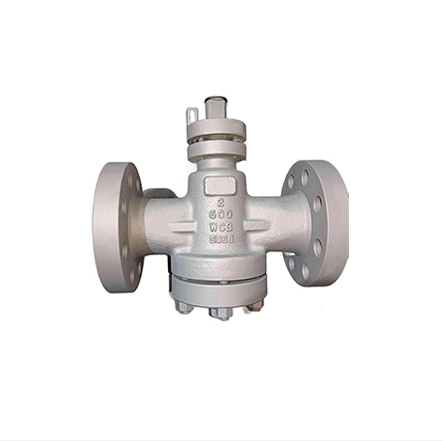Plug valves are essential components in industries that rely on fluid control, offering reliable and efficient solutions for managing the flow of liquids, gases, and slurries. At KFTE Valves, we specialize in providing high-quality plug valves tailored to meet the needs of various applications, from oil and gas to wastewater treatment. In this article, we'll explore what plug valves are, how they work, their types, applications, and how they compare to other valves like ball and gate valves.
A plug valve is a quarter-turn valve that uses a cylindrical or conical plug with a hollow passageway to control fluid flow. By rotating the plug 90 degrees, the valve either aligns the passageway with the pipeline to allow flow or blocks it to stop the flow. This simple yet effective design makes plug valves ideal for on/off operations and basic throttling applications.

Quarter-Turn Operation: A quick 90-degree turn opens or closes the valve, ensuring fast operation.
Compact Design: Plug valves are space-efficient, making them suitable for tight installations.
Versatility: Available in various types (lubricated, non-lubricated, multi-port, eccentric) to suit diverse applications.
Leak-Tight Performance: Provides excellent sealing, especially in low-pressure systems.
The operation of a plug valve is straightforward. The plug, which has a hollow passage, sits within the valve body. When the plug is rotated to align the passage with the pipeline, the valve is open, allowing fluid to flow. A 90-degree rotation positions the plug perpendicular to the pipeline, closing the valve and stopping the flow. This quarter-turn mechanism ensures quick and reliable flow control.
*Watch the video above to see an animated explanation of how a plug valve works.
Plug valves are widely used across industries due to their durability, simplicity, and ability to handle various fluids, including gases, liquids, and slurries. Common applications include:
Oil and Gas: Controlling flow in pipelines and fuel gas systems.
Wastewater Treatment: Managing slurries and sludge in treatment plants.
Chemical Processing: Handling corrosive or abrasive materials.
HVAC Systems: Regulating flow in heating and cooling systems.
Vacuum and Low-Pressure Systems: Ensuring leak-tight isolation.
At KFTE Valves, our plug valves are designed to meet the demands of these applications, offering robust performance and long-lasting reliability.
Yes, a plug valve is considered an isolation valve. Its primary function is to provide a tight shut-off, effectively isolating sections of a pipeline to stop the flow of fluid. This makes plug valves ideal for applications requiring reliable on/off control, such as in maintenance or emergency shut-off scenarios.
Plug valves come in various designs to suit specific needs. Here's an overview of the main types:
| Type | Description | Applications |
|---|---|---|
| Lubricated Plug Valve | Uses lubricant to reduce friction and ensure tight sealing. | Oil and gas, abrasive materials, dirty upstream applications. |
| Non-Lubricated Plug Valve | Low-maintenance design with elastomer sleeves or linings. | Chemical processing, low-maintenance systems. |
| Multi-Port Plug Valve | Features multiple ports for diverting or combining flow. | Flow diversion in HVAC, chemical, and water systems. |
| Eccentric Plug Valve | Offset plug design for minimal friction and tight shut-off. | Sewage, sludge, and slurry applications. |
Both plug valves and ball valves are quarter-turn valves used for flow control, but they differ in design and performance. Here's a detailed comparison:
| Feature | Plug Valve | Ball Valve |
|---|---|---|
| Design | Cylindrical or conical plug with a passageway. | Spherical ball with a central hole. |
| Flow Characteristics | Equal percentage flow, suitable for basic throttling. | Linear flow, ideal for precise control. |
| Sealing | Tight seal, less prone to leaks in low-pressure systems. | Good sealing but may leak if seals wear or debris accumulates. |
| Operation | Higher torque, harder to operate in large sizes. | Lower torque, easier to automate. |
| Pressure/Temperature | Best for low-pressure, low-temperature applications. | Suitable for high-pressure and high-temperature systems. |
| Cost | Generally less expensive for manual operation. | More expensive but cost-effective for automation. |
When to Choose: Opt for plug valves in low-pressure applications requiring tight sealing and minimal maintenance, such as slurry or wastewater systems. Choose ball valves for high-pressure, high-temperature applications needing precise control.
Gate valves and plug valves serve different purposes in flow control. Here's how they compare:
| Feature | Plug Valve | Gate Valve |
|---|---|---|
| Operation | Quarter-turn for quick on/off control. | Multi-turn, slower operation. |
| Design | Rotating plug with a passageway. | Sliding gate to block or allow flow. |
| Applications | Slurries, low-pressure systems, on/off control. | High-pressure systems, full isolation. |
| Flow Resistance | Minimal resistance when fully open. | Low resistance but not suited for throttling. |
| Maintenance | Inline maintenance, lubricated types need resealing. | Requires more space, higher maintenance. |
When to Choose: Plug valves are ideal for quick operation and applications with suspended solids, while gate valves are better for high-pressure isolation where throttling is not required.
At KFTE Valves, we offer a wide range of plug valves designed for durability, efficiency, and performance. Our valves are engineered to meet the needs of industries like oil and gas, chemical processing, and wastewater treatment. With our expertise and commitment to quality, we help you find the perfect valve solution for your project.
High-Quality Materials: Our plug valves are built to withstand harsh conditions.
Custom Solutions: Tailored valve designs for specific applications.
Expert Support: Our team provides guidance to ensure you choose the right valve.
Contact Us Today to learn more about our plug valve solutions!